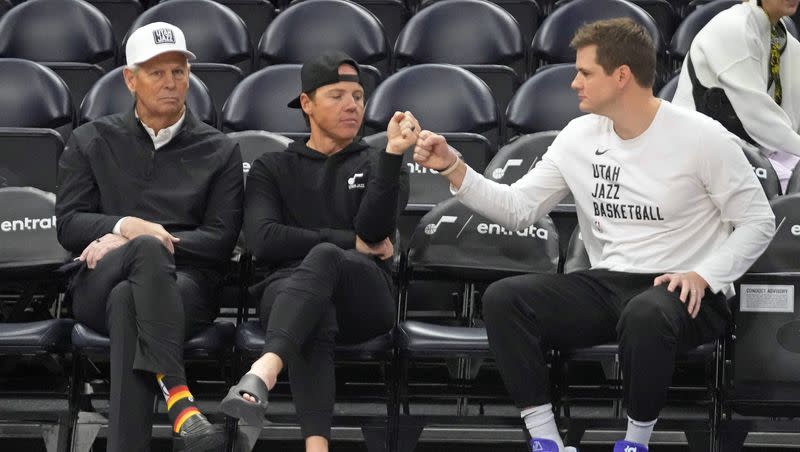Opinion: Unintended consequences of trades could cause the Jazz to struggle in rebuilding

In a vacuum, I understand what the Utah Jazz did at the trade deadline.
You prioritize capital and flexibility over short-term, middling success, in the hope that the assets you have will put you in a position to be able to form a team that is destined for true title contention.
In that context it makes a lot of sense to trade Kelly Olynyk and not have to be the team to pay Simone Fontecchio’s next contract. And though I might not agree with moving on from Ochai Agbaji, I can understand that he won’t be the player that would push a future Jazz team over the top, so if he was needed to make a deal work, fine.
But, this is not in a vacuum and there could be some unintended consequences to what the Jazz are doing.
Mainly, I worry about the mindset of the Jazz’s most important foundational pieces and the message the Jazz’s approach sends to the rest of the league.
If the Jazz’s intent is to secure a top-10 pick in the upcoming draft (otherwise that pick would be owed to the Oklahoma City Thunder), and I do believe that is their intent, how does that leave the players on this team feeling?
What does it do to Lauri Markkanen and Walker Kessler and Collin Sexton and Keyonte George if they think that the higher ups don’t want this team to win right now?
I can tell you that players were not happy with bottoming out last season after the roster was depleted, and it’s hard to see the light at the end of this tunnel. If the Jazz have another middling season next year, what’s to keep them from doing this again?
If the pick owed the Thunder does not convey this season, the Jazz will be in the same situation next season, with the pick once again top-10 protected and then top-8 protected in 2026.
It’s worth questioning how much the Jazz’s young core is going to continue to stay invested in the direction the Jazz are moving, if the direction is not clear.
I find it hard to believe that anyone in the Jazz front office thought they were going to be any better a team this season than they are. If that’s the case, then they have been thinking about depleting the roster and prioritizing the future from the beginning, but that was not a sentiment that has been shared with the players.
These guys thought they were going to fight for the playoffs. That’s why Jordan Clarkson opted in to stay in Utah, that’s why players have been understanding about changing roles and minute distribution and rotation experimentation.
We all know that Utah is not a destination city for top-tier free agents. But it’s also possible that role players in the league could see Utah as a place where the opportunity for success is low.
If players make decisions based on what they’ve seen over the last two seasons, they could believe that they will either be stuck after the trade deadline on a team that isn’t going to prioritize winning or possibly end up traded away to a non-contending team.
The Jazz obviously aren’t banking on free agents coming to Utah. They haven’t amassed a treasure trove of draft capital to try to make future trades, but keeping the confidence of players is important.
Current Jazz players and players they might acquire have to believe that there is a plan that makes sense. Playing every season until the trade deadline only to then look toward the draft is not going to work forever.
I realize that we are only in year two of the Jazz’s rebuild and that expectations for this team were not any higher than the play-in tournament, but at some point the Jazz are going to need to start playing to win, even if at first it means middling success.
I hope that when they finally do decide to go for it, the players are still bought in.
